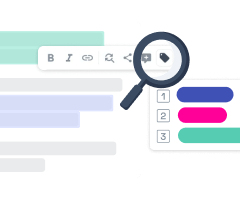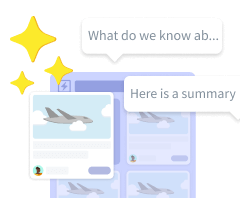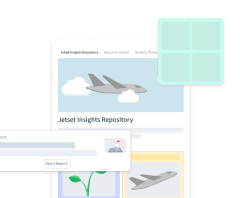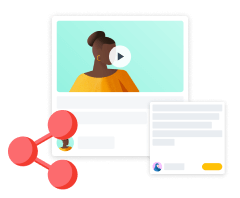
Measure Artifact Visibility and Reach
Proving the impact of user research can sometimes feel like sending a message in a bottle—carefully crafted, sent off with purpose, but unclear if it ever reaches the right people. Whether you're sharing insights in our Insights Magazine or directly with decision-makers, tracing their journey isn't always easy. This month’s product updates reveal who's clicking, engaging, and making waves, bringing research visibility into focus. Let’s take a look at what’s new!
In case you missed the previous product update:
Track views, sources, and audience insights with Artifact Analytics
After sharing your research, it’s not always clear what happens next. You’ve published your findings, added them to the Insights Magazine, shared them in Slack or Teams, and mentioned them in a meeting. But a few days go by, someone brings up a question you’ve already answered. Or worse, you start seeing decisions made without research in the mix.
And you’re left wondering:
„Was the research ever seen? Did it reach the right people? Is it being used at all?“
This uncertainty is something we hear a lot from researchers. You’ve put in the work, but without visibility into how your insights are landing, it’s tough to show their value or improve how you share them in the future.
That’s where Artifact Analytics comes in. It provides a clear view of how your research is being accessed across the organization. You can track:
How many times an Artifact has been viewed
Where those views came from (e.g., shared via Slack, direct link, or Magazine)
Which user roles or groups viewed the research.
For example, if you're curious whether stakeholders are finding research through the Magazine or mostly responding to direct Slack links, Artifact Analytics shows you what's actually working. Or, if you’re preparing for a quarterly review and want to demonstrate how your findings span across teams, it gives you real data to back up your story.
Whether you’re testing new ways to distribute insights or just want to understand how your research circulates, this feature brings much-needed clarity without the need for extra tools or manual tracking.
Know who saw an Artifact with Viewer history
Sometimes, knowing that someone probably read your research isn’t quite enough. Maybe a PM mentioned something from your study in a meeting, and you’re unsure whether they actually view the Artifact, or just hear about it secondhand. With Viewer History, you get a clear answer.

Now, in both Artifacts and Sessions, you can see exactly which users viewed them and when. It’s a small update that removes a lot of guesswork, especially when you’re prepping follow-ups or deciding who to include in the next round of discussions.
Quickly spot outdated Artifacts with Last edited date
Research repositories grow fast—and that’s a good thing. But it also means older Artifacts can easily resurface without much context. Now, every Artifact clearly shows when it was last edited, so you can get a quick sense of whether it’s up to date or might need a revisit before sharing it again.

Export a list of Projects for a quick overview or reporting
If you’ve ever been asked to “just send over a list of all the active Projects,” you’ll appreciate this one. You can now easily export a list of Projects to a CSV or Excel file with key details. Ideal for planning, reporting, or sharing with collaborators who aren’t in Condens but still need an overview.

Restore accidentally deleted work with Trash
We’ve all been there; mistakes happen. Whether it’s a deleted Project or an accidentally removed Artifact, you now have a 30-day safety net. The new Trash section in Settings makes it easy to recover deleted work, so no need to bother your workspace admin or dig through backups.

To wrap up May Product Updates
Research has always played a vital role in shaping products and experiences, but its impact isn’t always easy to track. These updates are a step toward making your work more visible and actionable, whether it’s through clearer sharing paths, easier reporting, or better understanding of who’s engaging with your research. We’ll continue to build in this direction, and if you have any ideas, feedback, or stories about how your team is making research impact visible, we’d love to hear from you!






